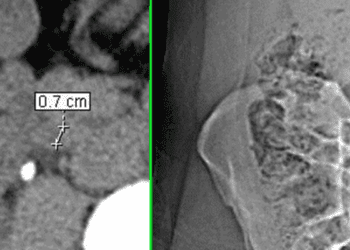Impact of point-of-care screening for hypertension, diabetes, and progression of chronic kidney disease in rural Manitoba Indigenous communities
1. Point of care screening interventions lead to higher frequency of comprehensive lab testing, medication prescriptions, and nephrology follow up visits.
2. In rural and remote Manitoban Indigenous communities, access to point-of-care screening was beneficial to monitor, treat, and prevent progression of chronic kidney disease
Evidence Rating Level: 3 (Average)
Study Rundown: Indigenous people living in remote and rural communities have higher rates of diabetes, hypertension, chronic kidney disease, and kidney failure compared to the rest of the Canadian population. Previous studies have explored attributing factors leading to these disproportionate rates, including poverty, poor access to quality health care services, and lifestyle risk factors. From 2013 to 2015, The First Nations Community Based Screening to Improve Kidney Health and Prevent Dialysis (FINISHED) program was launched. This point-of-care screening program was conducted in 9 rural and 4 remote Indigenous communities in Manitoba with 1470 Indigenous adults. Programs like FINISHED are cost-effective strategies designed to prevent and treat progression of diseases, such as chronic kidney disease. At the time of screening, participants were assessed, categorized based on 5-year-risk of kidney failure, and individually counselled for optimal follow-up care.
This case-control study aimed to better understand the impacts of the FINISHED initiative 18 months after screening. Specifically, the study aimed to assess the frequency of lab testing for kidney disease, prescriptions for antihypertensive or antiglycemic medications, and visits to the nephrologist or primary care physician after point-of-care screening. This data came from the FINISHED study as well as provincial, and federal databases 18 months after the screening. In order to assess the impact of FINISHED, screened participants (n=1353) were matched 1:1 with an individual in the comparison group of adults who were not screened. The intervention group had significantly greater increases in antihyperglycemic medication prescriptions, increased nephrology visits and improved comprehensive lab testing compared to the comparison group.
A notable strength of this study was its strong collaboration with Indigenous communities. The FINISHED initiative itself was Indigenous-led and the program was designed by Indigenous leaders and organizations in Manitoba. Furthermore, the study consistently respected Indigenous research principles throughout design, and additionally consulted Tribal council leaders and chiefs for ethical approval. Finally, Tribal council leaders and chiefs of the communities granted ethical approval to conduct this study. On the other hand, a limitation of the study was that it only took into account certain sociodemographic factors, such as age and sex, while failing to account for other factors that could have had a major impact on findings. For example, as a result of intergenerational trauma, some Indigenous people may choose to avoid healthcare systems and preventive interventions due to mistrust and thus, seek help later in the development of their disease. Overall, the study demonstrated that point-of-care screening for Indigenous people living in rural and remote areas can significantly improve chronic disease outcomes. This can be done by spreading awareness and education as well as preventing and properly treating diabetes, hypertension, and chronic kidney disease. Interventions, such as improving medication accessibility and prescriptions, follow-up care with specialists, and improved laboratory testing, can have long lasting impacts on these communities and their health.
Click to read the study in CMAJ
Relevant Reading: Kidney disease and care among First Nations people with diabetes in Ontario: a population-based cohort study
In-Depth [case-control study] A total of 1353 participants in rural and remote Indigenous communities in Manitoba were screened for hypertension, diabetes, and chronic kidney disease. In a 1:1 ratio, participants were matched to controls who had not undergone point-of-care screening. This study compared the frequency of comprehensive lab tests, medication prescriptions, and nephrologist visit rates between the two cohorts, 18 months after the screening program was conducted. The intervention group had significantly greater increases in antihyperglycemic medication prescriptions (7.7% [95% CI 2.7%-12.6%]), and increased nephrology visits by 1.9% [95% CI 0.3%-3.4%]. Finally, comprehensive lab testing increased significantly among the intervention group compared to the comparison group by 5% (95% CI 0.1%-9.8%).
Image: PD
©2021 2 Minute Medicine, Inc. All rights reserved. No works may be reproduced without expressed written consent from 2 Minute Medicine, Inc. Inquire about licensing here. No article should be construed as medical advice and is not intended as such by the authors or by 2 Minute Medicine, Inc.









